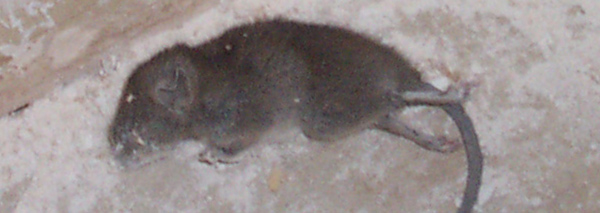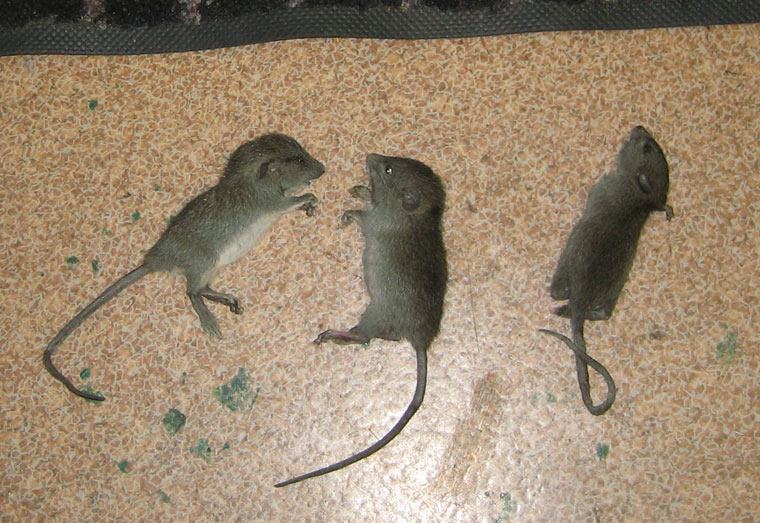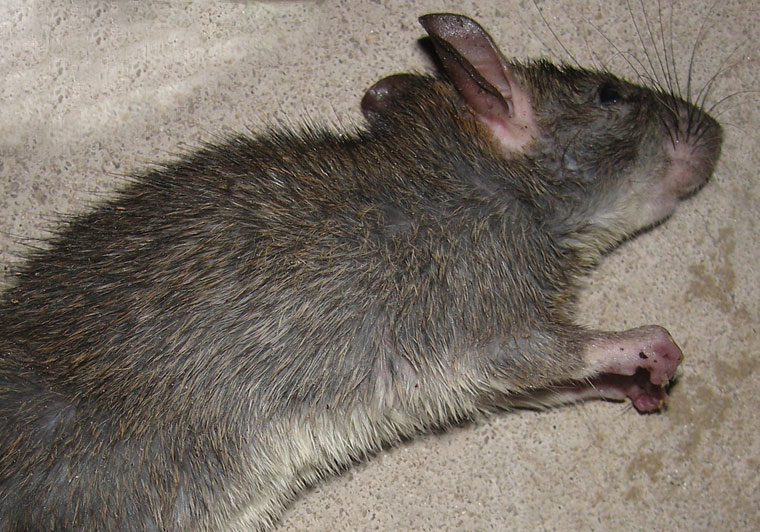- info@wildlife-removal.com
Call us for help in your town
Wildlife Removal Education
Does Using Poison Cause Dead Rats In The House?
Need rat removal in your hometown? We service over 500 USA locations! Click here to hire us in your town and check prices - updated for year 2020.
There are many people around the country who will think of poison as the solution when they have a rat infestation in their property, outbuildings or in the yard or garden of their home. Although these products are prominently displayed in hardware stores and garden centers, it is worth considering whether this is really a good option to take. Despite many myths to suggest that rats try to escape a property when poisoned, the reality is that they will often die in the house, and can cause a whole lot more problems when they do.

Do Rats Try To Get To Water When Poisoned?
This is a common idea that people will believe, as there are many poisons that cause rats and other animals to become dehydrated, but this doesn't cause the rats to try and go looking for a source of water. In fact, when animals feel ill they will go to the places where they feel safest, so if they were already nesting in the wall, attic or basement of your home, they will often try to return there instead.
How Quickly Do Poisoned Rats Die?
One of the main reasons why poisoning is not a favored way to deal with rats is that it is very cruel on the rat, as it can often take several days to die, meaning that it is very difficult to know where it will finally die. Poison also causes confusion in the animals, so they may die in areas where they would not otherwise have ventured, making it more difficult to find the carcasses so they can be removed.
Where Will You Find The Dead Rats?
Rats will generally remain in dark and warm areas of the property, so the kinds of places where you can find dead rats if you have used poison will be inside wall cavities, in the dark corners of attics and basements, and in the dark recesses behind furniture. This can mean that removing the dead rat is often more of a nuisance than actually living with the rat in the first place.
Alternatives To Poison
There are several better ways of dealing with rats in the house, and the easiest and most common way to do this is to lay traps, with the simple snap traps still one of the most effective ways of dealing with the rodents. If you are not too keen on removing the rats yourself, then professional animal removal experts can also help you to deal with a rat infestation.
3 Things You Shouldn’t Believe about Rat Poison

1 - Rat poison does not make rats go outside to find a source of water.
2 - Rat poison does not kill rats in a harmless, humane and quick way.
3 - Rat poison is not an effective method of rat removal from any property, and even less so when you have kids or pets/other animals.
There are a lot of myths about rat poison, especially on the internet, but believing these myths could create a much bigger problem than the rat infestation you initially planned to deal with. A pair of breeding rats can create anywhere from one thousand to two thousand young rat pups in just twelve months, as long as they have the right conditions to back them. The right conditions are going to be dark, warm, sheltered from the weather and predators, and also with food and water close by. Your attic and other areas in your home provide the perfect habitat for them, and it comes with built-in food supplies!
There is never a situation that calls for rat poison. If the rats do actually die and aren't immune like so many of them are these days, you will have no clue where the rat went to die. It might be in the nest. It might not even have made it back that far. If it made it back to the nest and you know where the nest is, finding and then disposing of the tiny rat carcass will be an easy job. What happens when you don't know where the nest is, however? Or if the rat didn't quite make it back to the nest before it died? It's going to be somewhere in your home and unless you physically go hunting for it, there's a good chance that you'll have no clue where it is until that awful stench kicks up.
Although the containers and packaging that rat poison comes in has come a long way, with covered containers to allow rats and mice in, but no other animals, but that doesn't mean it's the right solution for your rat job. That poison can still be accessed by other pets or wild animals, and that means you could be held responsible for the death of other animals in the local area. If the rats DO have an immunity to rat poison, there is likely to be a great deal of the stuff in the body when the rat does die, if it dies. Ten times the recommended dose might not be enough to kill of a rat that has built up an immunity to it, but it might still be enough to kill off the coyote or fox that eats the rodent's remains, or the cat who decides to use it as a toy.
Most of the stuff that you have read about rat poison is a myth. It's not an effective kill solution, or any kind of rat removal solution, and it can actually encourage other rats to come closer. When the poison isn't killing them, it's still providing rats with something to eat. It's designed to have a taste and smell that rats find pleasing, so many of them will flock to it and continue to eat, the poison taking no effect.
In the case that a rat does become sick and then dies from ingesting rodent poison, it will not be a quick death, and it certainly won't be a humane death either. In fact, quite the opposite. Most rat poison relies on anticoagulant medication, such as Warfarin, to stop the animal's blood from being able to clot. The poison works to break down and make weak the veins and arteries in the rat's body and when they do break and the blood seeps out, the non-clotting action will cause the rat to suffer with internal bleeding, which will then result in an inevitable death.
It will be painful. It will take a long time. It's not necessary.
Rat poison can take weeks to have any effect on the pack you have in your building, and in some cases it may not even work at all. There are other more effective methods of rat control, and we highly recommend that you focus your attention on those instead. It will be worth your while to do so, and you'll realize that if you try poison for yourself.
What Happens When You Poison a Rat?
We've all heard the age-old tales - when you poison rats they get thirsty and look for somewhere outside to curl up and die, right?

This never happens. Anyone who has ever tried to use poison to get rid of rats will tell you that this never happens. Ever. It might have happened once, with everyone basing the idea on that one story forever more, but it certainly isn't an approach that works in this day and age.
Over the last few years, the laws have changed a little as far as rats and poisoning is concerned. You can still poison rats in the same ol' way that you've been doing it for years, but they ned to be packaged and sold in a certain way now, and you also need to ensure that you're using the stuff in the right way. Leaving bundles of poison on the ground in the back yard that ends up killing your neighbor's cat IS a negligent action.
If poison can be accessed by kids and other animals, it will be eaten by kids and other animals. Think of neighborhood raccoons in the same way that you'd think of your toddler - they will put anything in their mouths. That's not your responsibility, obviously, but if you deliberately put poison out for rats and kill off a bunch of local wildlife, you can face criminal charges, especially if you kill animals that are not legally allowed to be killed.
What happens when rats eat poison?
Most rodenticides use an anti-coagulant formula (such as the medication, Warfarin) to stop the rat's blood from working properly. Essentially, if the rat were to get bitten or have a wound, it wouldn't stop bleeding. Other components of the poison will affect the veins and capillaries of the rat, causing them to burst, become brittle and damaged, and leak. When the blood leaks and can't clot, it won't be long before the rat has a serious internal bleeding problem on its hand. You won't see this to look at it, but the animal will be feeling very uncomfortable and in a lot of pain.
The rat doesn't necessarily go looking for water, but it might do. It doesn't feel very well and will likely to try to make itself sick (if it isn't vomiting already) or drink plenty of fluids. That's how many people would react to feeling generally under the weather too - lots of rest and fluids, right? If the rat does
Go back to the nest, it will stay there until it feels better, or it will die. If the latter happens, you have a dead rat somewhere in the building. Or in the next building. Or in the back yard. The point is: you won't know where the carcass ends up.
If the rat has an immunity to rat poison, it might need lots and lots of the stuff in order to have any effect. What this means is that the carcass of that dead rat now contains enough poison to kill off anything that attacks or eats it, such as neighborhood pets, raccoons, foxes, etc. If poisoning a rat ends up in the death of other animals, you may face questions about your actions.
Still sticking with the theme of rat poison immunity - if the rat doesn't eat enough of the poison to get around the immunity it has built up, the animal simply will not die.
So, essentially, you have two possible outcomes when you use poison to kill rats. You'll either end up with little or no effect at all, perhaps just killing one or two of a much greater group of rodents, or you'll have a whole bunch of dead rats (if the poison does work) scattered on your land and in your building.
The dead rats are actually just as much of a health risk, if not more, than the live ones are. And the dead rats attract other scavengers and pests too, including flies, maggots, and a wide range of other insects. It'll soon be like a palace for wild critters in your home.
Go back to the Rat Removal page, or learn tips to do it yourself with my How to Get Rid of Rats guide.


















